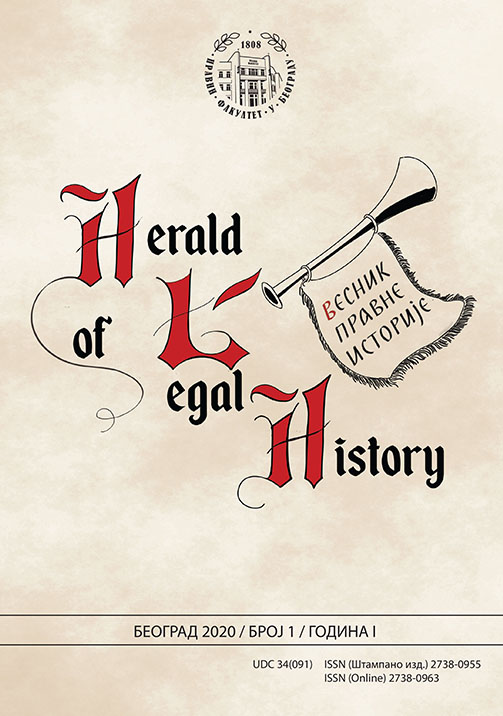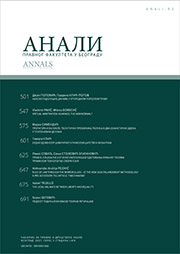ЖЕНЕ У ПАКИСТАНУ – УПОРЕДНА АНАЛИЗА ПРАВА ЖЕНА НА ОСНОВУ АНГЛОСАКСОНСКЕ И ИСЛАМСКЕ ПРАВНЕ ТРАДИЦИЈЕ
Сажетак
Овај рад скреће пажњу на правни положај жена у англосаксонској (common law) и муслиманској правној традицији (шеријатско право) Исламске Републике Пакистан. Он најпре разрађује концепт и историјску позадину шеријатског права. Рад затим детаљно осликава историјску позадину статуса жена у Пакистану на основу два главна параметра, то јест на основу њихових права према шеријатском праву и на основу њихових права у common law систему, тј. по Уставу и законима. Иако шеријатско право начелно поставља жене као једнаке мушкарцима, ипак постоје одређена питања у којима се жене третирају неједнако, попут брака, развода, наслеђивања, стварних права, итд. Рад се закључује свеобухватном анализом права жена у Пакистану под оба правна система кроз анализу судске праксе.
Референце
Gazette of India, Factories Act, India, 20.8.1934 (Act No. XXV OF 1934).
Hafiz Abdul Waheed v. Asma Jehangir, PLD 2004 SC 219.
Imperial Legislative Council, Code of Civil Procedure, India, 1.1.1908 (Act No. 5 of 1908).
Imperial Legislative Council, Criminal Procedure Code (Cr.P.C), India, 1.4.1898 (Act No. 2 of 1974).
Imperial Legislative Council, Child Marriage Restraint Act, India, 29.9.1929.
Married Women Property Act, England-Wales, 1874 (33 & 34 Vict. c.93).
Muhammad Ashraf v. Farzana Kousar, 2016 CLC 1473.
Mines Maternity Benefit Act, Pakistan, 26.11.1941 (Act No. XIX of 1941).
Mst. Fazal Jan v. Roshan Din and 2 others, PLD. 1992 SC 811.
Muslim Family Laws Ordinance, 1961, The Official Gazette of Pakistan, 7.10.1958 (Ordinance No. VIII of 1961).
National Assembly Secretariat, Dowry and Bridal Gifts (Restriction) Act, The Gazette of Pakistan, 15.6.1976.
National Assembly, The Constitution of the Islamic Republic of Pakistan, Islamabad 2010.
Offences of Qazaf (Enforcement of Hadd) Ordinance, The Official Gazette of Pakistan, 9.2.1979 (Ordinance No. VIII of 1979).
Pakistan Penal Code (PPC), Pakistan, 6.10.1860 (Act No. XLV of 1860).
Rafique Bibi v. Sayed Waliuddin, 2004, 1 SCC 287.
Roshni Desai v. Jahanzeb Niazi, 2011PLD 423.
Salman Akram Raja vs. Government of Punjab, Constitution Petition No. 38, 2nd October, 2012, 2013 SCMR 203.
Shrin Munir and others v. Government of Punjab and Another, PLD 1990 SC 295.
The Dissolution of Muslim Marriage Act, India, 17.3.1939 (Act No. 8 of 1939).
The Guardians and Wards Act, India, 1.7.1890.
The West Pakistan Maternity Benefit Ordinance, The Official Gazette of Pakistan, 22.12.1958 (W.P. Ordinance XXXII OF 1958).
The West Pakistan Family Courts Act, The Official Gazette of Pakistan, 18.7.1964 (Act XXXV of 1964).
Alice Bettencourt, Violence against Women in Pakistan, Litigation Report, Human Rights Advocacy Clinic, 2000.
Ownership of Property in Islamic Law, 2018. https://www.ukessays.com/essays/ anthropology/property-ownership.php, last visited 20.4.2020.
Tahmina Rashid, “Crimes against women in Pakistan”, Policy Forum, https://www. policyforum.net/crimes-against-women-in-pakistan/, last visited 7.8.2020.
Athar Ahmad, “The women who sleep with a stranger to save their mariage”, BBC News, https://www.bbc.com/news/uk-39480846, last visited 20.04.2020.
Yusuf Al-Hajj Ahmad, The Book of Nikah: Encyclopedia of Islamic Law, Darussalam Publishers, Volume II, 2014.
Shaheen Sardar Ali, Anne Griffiths, From Transnational Relations to Transnational Laws: Northern European Laws at the Crossroads, Routledge, 2016, Chapter 5.
Asghar Ali Engineer, They Too Fought for India’s Freedom: The Role of Minorities, Hope India Publications, Gurgaon 2006, 72.
Cheryl Benard, Mapping the Issues: An Introduction To The Range Of Thought In Contemporary Islam, 1st ed., RAND Corporation, Santa Monica 2003.
Tom Brooks-Pollock, “The countries where a majority of Muslims want to live under Sharia law”, The Independent, https://www.independent.co.uk/ news/world/countries-where-majority-muslims-want-live-under-sharialaw-a6773666.html, last visited 20.4.2020.
Norman Calder, “Law: Legal Thought and Jurisprudence”, John L. Esposito (ed.), The Oxford Encyclopedia of the Islamic World, Oxford University Press, Oxford 2009.
Azam Chaudhary, “The Rule of Law Problems in Pakistan: An Anthropological Perspective of the Daughter’s Traditional Share in the Patrimony in the Punjab”, Pakistan Journal of History and Culture 30/2009, 101–103.
Imran Sharif Chaudhry, “Gender Inequality in Education and Economic Growth: Case Study of Pakistan”, Pakistan Horizon 60/2007, 81–91.
Shahbaz Cheema, “Protection of Legal Status of Women in Pakistan: An Analysis of the Role of Supreme Court”, International Journal of Physical and Social Sciences 4/2014, 615–627.
Karen O’Connor, Gender and Women’s Leadership: A Reference Handbook, SAGE Publication, London 2010, 382.
https://doi.org/10.4135/9781412979344
Ahmad S. Dallal, Jocelyn Hendrickson, “Fatwā: Modern usage”, John L. Esposito (ed.), The Oxford Encyclopedia of the Islamic World, Oxford University Press, Oxford 2009.
Ronald J. Daniels, “The Legacy of Empire: The Common Law Inheritance and Commitments to Legality in Former British Colonies”, The American Journal of Comparative Law 59/2011, 111–178.
https://doi.org/10.5131/AJCL.2010.0015
John L. Esposito, Natana J. DeLong-Bas, Women in Muslim family law, Syracuse University Press, Syracuse 2001.
John L. Esposito, The Oxford Dictionary of Islam, Oxford University Press, Oxford 2003.
John L. Esposito, Islamic Law: The Oxford Dictionary of Islam, Oxford University Press, Oxford 2014.
Mohammad Fadel, “Two Women, One Man: Knowledge, Power and Gender in Medieval Sunni Legal Thought”, International Journal of Middle East Studies 29/1997, 185–204.
https://doi.org/10.1017/S0020743800064461
Asaf A. A. Fyzee, Outlines of Muhammadan Law, Oxford Publishers, Oxford 1964.
Abdul Ghafur Muslim, “Islamization of Laws in Pakistan: Problems And Prospects”, Islamic Studies 26/1987, 265–276.
Rainer Grote, Constitutionalism in Islamic Countries: Between Upheaval and Continuity. Oxford University Press, Oxford 2012.
https://doi.org/10.1093/acprof:osobl/9780199759880.001.0001
Wael B. Hallaq, Sharī’a: Theory, Practice, Transformations, Cambridge University Press, Cambridge 2009.
https://doi.org/10.1017/CBO9780511815300
Amna Hassan, “Impact of the European Private Law Codification Outside Europe I: Common Law in the Old Colonial Empire”, Dezső Márkus Research Group for Comparative Legal History (DIKE), 3/2020, 170–183.
Nayer Honarvar, “Behind the Veil: Women’s Rights in Islamic Societies”, Journal of Law and Religion 6/1988, 355–387.
https://doi.org/10.2307/1051156
Husssain Haqqani, Pakistan: Between Mosque and Military, Carnegie Endowment, 2010, 18.
Roza Ibrahimova, “Dozens Killed in Violence in Northern Nigeria”, Al Jazeera, https://www.dailymotion.com/video/xr5wnq, last visited 20.4.2020.
Masako IIjima, “Islamic Police Tighten Grip on Indonesia's Aceh”, Reuters, https://www.reuters.com/article/us-indonesia-aceh-police-idUSTRE60D0 7420100114, last visited 20.4.2020.
Nasir Iqbal, “SC gives deceased woman rightful share in inheritance”, DAWN, https://www.dawn.com/news/1243270, last visited 20.4.2020.
Khurshid Iqbal, The Right to Development in International Law: The Case of Pakistan, Routledge, 2009.
https://doi.org/10.4324/9780203874974
Ibn Kathir, Tafsir Ibn Kathir, Surah Al Baqarah, Part II.
Charles H. Kennedy, “Islamic Legal Reform and the Status of Women in Pakistan.” Journal of Islamic Studies 2/1991, 45–55.
https://doi.org/10.1093/jis/2.1.45
Gilles Kepel, Jihad: The Trail of Political Islam, I.B.Tauris, London 2002.
Nazir Khan, Tesneem Alkiek, Safiah Chowdhury, “Women in Islamic Law: Examining Five Prevalent Myths”, https://yaqeeninstitute.org/nazir-khan/women-in-islamic-law-examining-five-prevalentmyths, last visited 20.4.2020..
Ayesha Khan, Nida Kirmani, “Moving Beyond the Binary: Gender-based Activism in Pakistan”, Feminist Dissent, 3/2018, 151–191.
https://doi.org/10.31273/fd.n3.2018.286
Sher Ali Khan, “Global connections: The crackdown on HizbutTahrir intensifies”, Herald, DAWN, http://herald.dawn.com/news/1153325, last visited 20.4.2020.
Sir Wilson Roland Knyvet, Anglo-Muhammadan Law, Law Publishing Company, Lahore 1930.
Ira Lapidus, The Cambridge Illustrated History of the Islamic World, Cambridge University Press, Cambridge 1996.
Roger D. Long, Gurharpal Singh, Yunas Samad, Ian Talbot, State and Nation-Building in Pakistan: Beyond Islam and Security, Routledge, 2015.
https://doi.org/10.4324/9781315696904
Abul A’ala Maududi, Syed Abu-Ala’ Maududi’s: Introductions to the Qur’an, Amazon 2012.
Ann Elizabeth Mayer, “Law: Modern Legal Reform”, John L. Esposito (ed.), The Oxford Encyclopedia of the Islamic World, Oxford University Press, Oxford 2009, 381–389.
Shampa Mazumdar, Sanjoy Mazumdar, “Rethinking Public and Private Space: Religion and Women in Muslim Society”, Journal of Architectural and Planning Research 18/2001, 302–324.
Siam Heng-Heng Michael, Chin Liew Ten, State and Secularism: Perspectives from Asia, World Scientific, Singapore 2010.
Imani Jaafar Mohammad, Charlie Lehmann, “Women’s Rights in Islam Regarding Marriage and Divorce”, Journal of Law and Practice 4/2011, 1–13.
Annelies Moors, Women Property and Islam: Palestinian Experience 1920–1990, Cambridge University Press, Cambridge 1995.
https://doi.org/10.1017/CBO9780511558085
Papa Murphy, Inheritance Laws in an Islamic Society: Islamic Cultures Are Distinct in Everyway, iUniverse, US 2012.
Sunan An-Nasai, Hadith 20, The Book of Jihad, Chapter 6.
Feisal Naqvi, “Dispute Resolution: A Jury of One”, The Counsel, 3/2013.
R. A. Nicholson, A literary history of the Arabs, Cambridge University Press, Cambridge 1969.
Karen Offen, “Women in the Western World”, Journal of Women’s History 7/1995, 145–151.
https://doi.org/10.1353/jowh.2010.0359
Jan Michiel Otto, Sharia Incorporated: A Comparative Overview of the Legal Systems of Twelve Muslim Countries in Past and Present, Leiden University Press, Leiden 2009.
Jan Michiel Otto, Sharia and National Law in Muslim Countries: Tensions and Opportunities for Dutch and EU Foreign Policy, Amsterdam University Press, Amsterdam 2008.
Mariam S. Pal, Women in Pakistan: Country Briefing Paper, Asian Development Bank, 2000.
Shaun D Pattinson, “The Human Rights Act and the doctrine of precedent”, Legal Studies 35/2015, 142–164.
https://doi.org/10.1111/lest.12049
Nadeem F. Paracha, “The first Pakistani?”, DAWN, https://www.dawn.com/news/ 1175127, last visited 20.4.2020.
Intisar A. Rabb, “Law: Civil Law & Courts”, John L. Esposito (ed.), The Oxford Encyclopedia of the Islamic World, Oxford University Press, Oxford 2009.
Shamimur Rahman, “Women’s bill sets tough penalties”, DAWN, https://web. archive.org/web/20100131230825/http://www.dawn.com/wps/wcm/connect/ dawn-content-library/dawn/news/pakistan/04-zardari-signs-women-protbill-qs-08, last visited 20.4.2020.
Shazia Rafi, “A case for Gandhara”, DAWN, https://www.dawn.com/news/1164469, last visited 20.4.2020.
Staff Report, “President signs two women's rights bills into law”, Pakistan Today, https://www.pakistantoday.com.pk/2011/12/23/president-signs-twowomen%E2%80%99s-rights-bills-into-law/, last visited 20.4.2020.
Reuters, “Sherry Rehaman appointed Pakistan's ambassador to US”, DAWN, https://www.dawn.com/news/675333/sherry-rehman-appointed-pakistansambassador-to-us, last visited 20.04.2020.
Achim Rohde, State-Society Relations in Ba’thist Iraq: Facing Dictatorship, Routledge, 2014.
Ibn Rushd, Bidayatu’l-Mujtahid (1st ed.), Daru’l-Ma‘rifah, Beirut 1997.
Alexander David Russel, Muslim Law: An Historical Introduction to the Law of Inheritance, Routledge, 2013.
https://doi.org/10.4324/9780203707951
Rubina Saigol, “Pakistan’s Long March”, Development and Cooperation 36/2009, 208–210.
Rubina Saigol, “What is the most blatant lie taught through Pakistan textbooks?”, Herald, DAWN, https://www.dawn.com/news/1125484, last visited 20.4.2020.
Tad Stahnke, Robert C. Blitt, “The Religion-State Relationship and the Right to Freedom of Religion or Belief: A Comparative Textual Analysis of the Constitutions of Predominantly Muslim Countries”, Georgetown Journal of International Law 36/2005, 13–19.
Devin J. Stewart, “Shari’a”, Gerhard Böwering, Patricia Crone (ed.), The Princeton Encyclopedia of Islamic Political Thought, Princeton University Press, 2013. Dr. Abdul Razak Shaikh, “Women’s status in Pakistan”, DAILY TIMES, https:// dailytimes.com.pk/362564/womens-status-in-pakistan/, last visited 20.4.2020.
M. Mazheruddin Siddiqui, Women in Islam, The Institute of Islamic Culture, 1952, 23–24.
Vatsala Singh, “What does Quran say about Nikah Halala? Will banning it help?”, Bloomberg LP/The Quint, https://www.thequint.com/voices/women/so-whatdoes-the-quran-say-about-nikah-halala-triple-talaq-polygamy, last visited 23.4.2020.
Ian Talbot, Pakistan, a Modern History, St. Martin’s Press, New York 1998.
Kashif Mahmood Tariq, “Impact of Anglo-American Jurisprudence on The Pakistan’s Legal system”, Pakistan Journal of Islamic Research, 17/2016, 127–140.
Imtiaz Tyab, Pakistani police seeks to recruit more women, Al Jazeera, Doha 2014.
Charris Waddy, Women in Muslim history, Longman ELT, London 1980.
John Wilson, Vikram Sood, Akmal Hussain, Pakistan’s economy in historical perspective: The Growth, Power and Poverty, Dorling Kindersley (Pvt) Limited, New Delhi – Washington D.C. 2009.
Afiya Shehrbano Zia, “The reinvention of feminism in Pakistan”, Feminist Review, 91/2009, 29–46.
https://doi.org/10.1057/fr.2008.48
Farhat J. Ziadeh, “Criminal Law”, John L. Esposito (ed.), The Oxford Encyclopedia of the Islamic World, Oxford University Press, Oxford 2009.
Ira Marvin Lapidus, A History of Islamic Societies, Cambridge University Press, Cambridge 2002.





